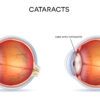
How to Prevent Cataracts Naturally
Let’s get some bad news out of the way first. If you have eyes, you are at risk of developing cataracts at some point in your life. It’s a natural part of aging. Your eyes become overused and tired. But this doesn’t have to be a metaphorical death sentence for your eyesight. It is possible to prevent cataracts naturally.
Natural remedies can not only ease the symptoms of cataracts, but they can prevent further development. Though these remedies may not be able to cure cataracts just yet, they can slow the progression of them. But, before we get into the natural remedies, we’ll first explain a little about cataracts.
What Are Cataracts?
There’s a lot of talk about cataracts, mostly about how much we should fear them. But what are they exactly? Simply put, cataracts blur and cloud your vision, which many describe as looking out of a dirty windshield. There’s nothing more annoying than a dirty windshield that you can’t clean. If left untreated, cataracts can sometimes lead to blindness.
This blurred vision happens when the lens of the eye becomes clouded. Light travels from the pupil, through the lens, to the eye’s light-sensitive part called the retina. When the lens becomes cloudy, the light is unable to focus, which then results in poor vision. This can happen to one or both eyes. If it happens to one eye, it isn’t guaranteed that you’ll experience the same in the other eye.
 The lens becomes clouded as a normal result of aging. The new cells growing on the outside of the lens push the older ones into the center of the lens. This buildup of protein at the center of the lens is the cataract that clouds your vision. Luckily, there are ways to prevent cataracts naturally.
The lens becomes clouded as a normal result of aging. The new cells growing on the outside of the lens push the older ones into the center of the lens. This buildup of protein at the center of the lens is the cataract that clouds your vision. Luckily, there are ways to prevent cataracts naturally.
Cataracts Symptoms and Types
It’s important to be on the lookout for cataracts. Yes, they’re a disease most often related to age, but they can be caused by numerous other factors. The more you know about how to spot a forming cataract, the quicker you can begin slowing it down.
Much of the time, cataracts form and the sufferer doesn’t know it. They only realize it when it’s too late to reverse. Cataracts can develop without affecting your vision for a long time. When they do finally start to take effect, it may be too late for your vision to recover. The best way to know if you have a developing cataract is to have regular eye exams.
Symptoms
The rule of thumb is to get your eyes checked by a professional about once a year. Or, more frequently if you have an existing eye condition. Cataracts can form at any time and don’t care if it’s convenient for you. Do yourself a favor and be on the lookout for these cataract symptoms the other 364 days of the year:
- Unusually blurry or foggy vision
- Progressive nearsightedness
- Seeing colors differently (not as vivid or bright) as you used to
- Diminishing night vision
- Glare both in the daylight and nighttime (from headlights and other artificial light sources)
- Double vision or seeing double
These symptoms can be debilitating for some. If you notice something wrong, make an appointment with your eye doctor immediately.
Types of Cataracts
Cataracts aren’t solely an age-related disease. They are mostly found in middle-aged people (most cataracts begin forming in people’s 40s). But, cataracts can also be found in babies and can develop after an eye injury. Let’s take a look at some of the most common cataract types:
- Age-related cataracts: The most common form, affecting people as they age.
- Congenital cataracts: Found in newborn babies as a result of infection, poor eye development, or injury.
- Traumatic cataracts: Form after an eye injury.
- Secondary cataracts: Form due to other ailments such as diabetes or exposure to toxic substances.
Once these have developed, there’s no going back to the way your eyes once were. Your best option is to improve the eyesight you have left through natural, safe, and inexpensive methods.
Be the Boss of Your Eyes: How to Prevent Cataracts Naturally
Don’t let cataracts dictate your life. Whether you have them already, in the early stages, or just want to take preventative measures, you can do it. You’re the boss of your own body. Don’t let your vision condition impede you from doing daily routines or partaking in your favorite activities.
Today, the only “cure” for cataracts is surgery. But surgery can be dangerous and expensive. Why put yourself through that if you can prevent cataracts naturally? All you need is the will to make some simple lifestyle changes. Oh, and of course the strong desire to have healthy eyesight for the rest of your life.
The first thing you can do is brighten up your home. Brighter lights, compared to dim lights, reduce the strain on your eyes. Another thing you can do is make sure that your current contact lens or eyeglass prescriptions are accurate. Also, avoid using someone else’s prescription glasses.
Another simple thing you can do is to wear sunglasses. Protect your eyes from harmful rays and sunburns. On that note, avoid tanning booths, which produce the same harmful rays as the sun dangerously close to your body.
One habit that is sure to skyrocket your risk of cataracts is smoking. The whole body is all connected. If you think you’re only damaging your lungs by smoking, you’re wrong. Quitting smoking is hard to do, but it isn’t impossible. Do it for your eyes, but also for your overall health.
For those looking to improve their current cataract-ridden eyes, another simple fix is to change your diet. We’re not talking about spending hundreds of dollars on special organic foods. No, all you need to do is add some eye health superfoods to your diet and you’ll see the results you want.
Spinach, raw cacao, kale, and kiwi are all foods that are loaded with the best eye vitamins, nutrients, and minerals. Incorporating these into your daily meals is easy. Just one cup of spinach a day is enough to help fight diseases like cataracts and other age-related eye conditions.
Berries and fresh fruit, like avocados, are great for the eyes. Berries have antioxidants that help fight free radicals (which can lead to cataracts). Fresh fruit has nutrients such as beta-carotene, and vitamins C, E, and B6. You can eat delicious foods and save your vision all at the same time.
Cataracts aren’t something to be feared anymore. With all these ways to naturally prevent them, there’s no need for your vision to worsen. Say no to surgery with confidence that these natural remedies will help improve your vision and help you stay healthy.
Our Rebuild Your Vision Ocu-Plus Formula Contains All 17 Vitamins, Minerals, and Herbal Supplements to Protect Against Cataracts!












My wife is a doctor specialising in diet and nutrition, with an emphasis on Functional Medicine. I had a cataract operation last year and have been told that I have the start of a cataract in my other eye. She has been researching FM’s approach to cataracts and her recommendation is (roughly) as follows: cut out carbs (especially grains, esp. wheat), dairy (except organic, unpasteurised milk and butter made from such milk), caffeine and all kinds of sugar (with the possible exception of organic honey). This basically leaves you with a diet of fish, meat, fruit in moderation and vegetables (organic, natch). Actually not such a bad diet, though I have trouble with wanting to snack (but seeds and nuts are OK, apparently). An interesting website along similar lines is https://www.thenourishinggourmet.com/ (we have no connection with it).
My name is PEDRO Y SOTO, I have been very worried about my wife .. She has Grave Disease ,and getting worse.. Please HELP ME how to make a Riecepe
I have been reading about this, and I think I’ll try it before deciding to have surgery. One of the articles I read said that it could take up to six months, but it’s worth the wait if it’s a lot less expensive and safer!
https://www.pbs.org/newshour/science/eye-drops-clear-cataracts
My eye doctor, at my last exam almost a year ago, said that I had the very beginning of a cataract in one of my eyes. Would eating the things listed above help the cataract from developing or is it too late once it has begun?
Hi,
I am taking the Ocu Plus formula. I was told that I had a Macular Pucker and I can tell you that there is an improvement in my vision – although the symptoms of the pucker are still there, they have improved.
Thank you so much.
That’s great Margeurity. We are happy to hear that it’s helping you.
While I appreciate all that you do to help people to maintain healthy and good vision, I want to take issue with on statement in your article: You say that developing cataracts is a natural part of aging. I believe that is wrong and the evidence does not support it. Rather, cataracts is an UNATURAL part of aging, due to diet, toxins, lifestyle and related factors. This must be so because there are plenty of people who are well over 100 years old and who do NOT have cataracts.
Furthermore, the rest of the human body seems to be able to remain healthy for well over 100 years, provided we take good care of it. So it does not make sense that vision, which is so critical to our survival would have such a devastating “design flaw” built in.
At some point, I believe we will learn what toxins in our environment, in our food and perhaps other related factors cause cataracts to develop.
once you have cataracts will these vitamins make them disappear? Or is this a preventive way of not getting them? Thanks for any information you are able to provide. Louise